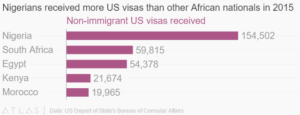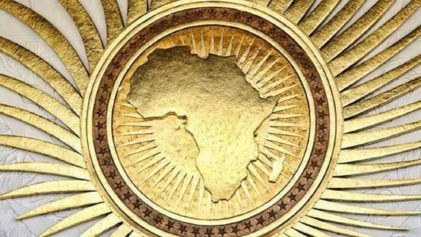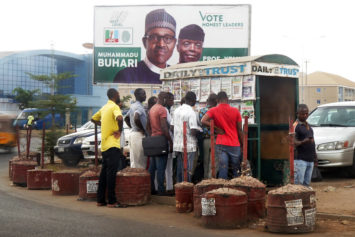
African Union flag. Source: Wikimedia Commons
President Trump’s Muslim ban, halting all refugee programs and immigration from certain Muslim nations, is anti-American, its critics say. But the immigration measure is also anti-Black, and the African Union made note of that as it blasted the new American president and his country for its role in the slave trade.
On January 27, Trump issued an executive order on immigration that temporarily banned travel from seven countries, all of them Muslim nations — Iran, Iraq, Libya, Somalia, Sudan, Syria and Yemen. Libya, Somalia and Sudan are African nations, a point that has been omitted in recent discussions of the ban. The order does not include the countries of origin of the 9/11 terrorists nor does it include Muslim nations with which Trump has business dealings.
Ironically, this executive order, which would presume to ban terrorists from entry to the U.S., fails to acknowledge America’s history of terrorism against people of African descent. Further, an edict that purports to deny entry to “those who would oppress Americans” ignores the nation’s enduring legacy of racial oppression and enslavement. This is a point that was reinforced by the head of the African Union in response to Trump.
Nkosazana Dlamini-Zuma, the South African politician, anti-apartheid activist and chairperson of the African Union Commission, noted the hypocrisy of the Trump immigration ban. She made her remarks during a during a two-day summit for the AU’s 53 member states in Addis Ababa, as The Independent reported. “Excellencies, it is clear that, globally, we are entering very turbulent times. For an example, the very country to whom our people were taken as slaves during the transatlantic slave trade has now decided to ban refugees from some of our countries. What do we do about this? Indeed, this is one of the greatest challenges and tests to our unity and solidarity,” Dlamini-Zuma said.
The AU chief’s statements come at a time when African nations and the international community watch the transition from Barack Obama to Donald Trump with consternation. There is concern that the “America First” priorities of the new U.S. leader will lead to Africa being placed on the back burner of U.S. trade and foreign policy.
“African nations are among the world’s largest and most generous hosts of refugees,” U.N. secretary-general Antonio Guterres said, according to Reuters. “African borders remain open for those who need protection when so many borders are being closed, even in some of the most developed countries in the world.”
The African nations affected by the Trump policy are experiencing a humanitarian crisis. Libya, which is in a state of civil war following the 2011 overthrow of Muammar Qaddafi, has two million people in need of assistance or protection due to the violence, according to Slate. Somalia, rocked by 25 years of conflict, is mired in poverty, plagued with a breakdown of its political and economic systems and the al-Qaeda-linked group al-Shabaab. Further, two million of its citizens live outside of the country, placing Somalia third behind Syria and Afghanistan as the largest refugee-producing nation, as Quartz reported. And armed conflict in the Sudan has led to the displacement of hundreds of thousands of people.

Meanwhile, African immigrants and refugees are feeling the impact of the new policy, exacerbating the hardships they have already endured. For example, children from refugee camps whose trips to the U.S. would normally be expedited are now blocked, as The Washington Post reported. This includes a 9-year-old Somali child in Ethiopia who has a congenital heart disease that cannot be treated in a refugee camp, a 1-year-old Sudanese boy suffering from cancer and a Somali boy with an acute intestinal disorder, but whose refugee camp lacks the colostomy bags he needs.
“African [immigrants] around the country are confused and upset by the rhetoric and the threats,” said Amaha Kassa, an immigration lawyer and founder of African Communities Together, an African immigrants rights nonprofit whose 2,000 members live between New York and Washington, D.C. He told PRI that several hundred of them risk deportation under the new administration crackdown. “They want to know, ‘What does it mean for me, for my family?'” Kassa added.
Meanwhile, to be a Black immigrant in America is to bear a higher risk of coming in contact with the criminal justice system, often leading to deportation. A 2016 study from the Black Alliance for Just Immigration and the Immigrant Rights Clinic at the New York University School of Law found that Black immigrants are far more likely than others to be deported due to a criminal conviction. According to the report, more than one out of every five noncitizens facing deportation on criminal grounds is Black. In addition, for Black people, a greater chance of coming into contact with the authorities increases the chances they are victimized by police violence.
America, with iconic symbols such as the Statue of Liberty and Ellis Island, is often called a land of immigrants. Yet, not all immigrants are welcome and not all are immigrants. Consider the native indigenous population, the victims of genocide by white people after living here for thousands of years, and those African people brought to the “land of the free” robbed, shackled and in slave ships.
The transatlantic slave trade was an atrocity of historic proportions. And it took an extreme toll on the African continent, with estimates stating that as many as 100 million African men, women and children were kidnapped between 1445 and 1870, never to return home. Of those who were stolen and warehoused in the bowels of floating slave dungeons like chattel, an estimated 16 million died.
Among the millions of Africans who were forcibly transported to the New World, about 388,000 were sent to the United States, according to The Root. Moreover, in 1860, slaves constituted 16 percent of all household assets in the South, worth an estimated $10 trillion in today’s terms. An insidious policy drained the motherland of its human resources to provide a free forced-labor source for the U.S., creating the foundation of capitalism, Wall Street and corporate America, and building vast intergenerational, inherited white wealth from which Black people were unable to benefit.
Meanwhile, as Trump seeks to bar Black people from entering the country, he does not consider the debts Uncle Sam owes Africans for stealing them from their countries of origin and for robbing them of their language, their culture and their institutions. Surely, he would shrug his shoulders and say that was a long time ago.


